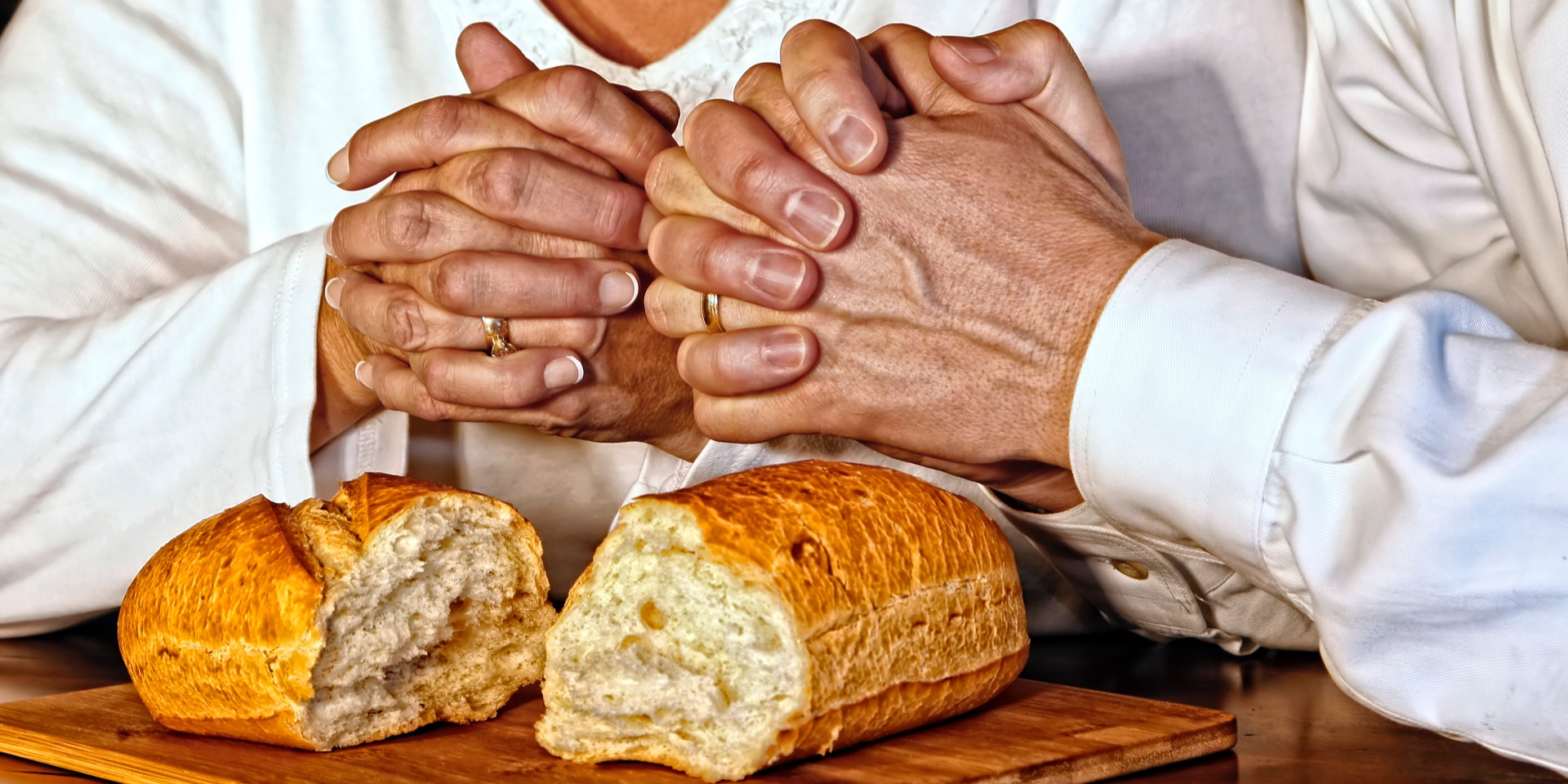It could be a perfunctory ritual, passed down through generations; a mechanically recited poem. But equally, the mealtime prayer can be a genuine spiritual exercise.
The sensation of being satiated has been a luxury for most people throughout the vast majority of history, says oncologist Ezekiel Emanuel, emphasising that this alone is a compelling reason to pray before a meal. The Jewish doctor recounts raising his children in this manner, giving thanks for every meal they shared, and how he felt a void as his children grew up and moved away, making opportunities to pray before a meal with an array of cutlery increasingly rare. So, when he went to a restaurant with friends, he did not miss the chance to express gratitude for the abundance of food (something not accessible to every inhabitant of our planet, not even in the 21st century).
Saying grace before meals is a widespread practice in the United States, as shown by a survey conducted by The Washington Post and the Kaiser Family Foundation. Nearly half of Americans reserve about a minute to say a prayer before eating—and this surprisingly high percentage encompasses Americans from the North and South, urban and rural areas, Catholics and Protestants, Democrats, and Republicans alike.
In fact, this brief prayer is “a powerful way of reminding yourself that you are not self-sufficient, that you are living by somebody’s grace, that plenty of other people who work just as hard as you don’t have anything to eat,” says Pastor Tim Keller, summarising some of the reasons why people of different faiths still approach their meals, whether sumptious or sparse, with heads bowed and hands folded in prayer.
The mealtime prayer that expresses gratitude
The modern human has lost the true joy of eating (and cooking), developing an imbalanced relationship with food, health educator Tracie Abram says. We focus less and less on what’s on our plate—we don’t allow our eyes to delight in the array of colours, nor do we let our taste buds savour each bite of food for an extended period. And because we miss out on this feast of looking, smelling, and prolonged chewing, we compensate with portion sizes and calorie counts. Food is considered a given, and the act of eating blends with (or is even swallowed by) other more or less important daily activities.
What if we took the time to understand how blessed we are not to worry about what we’ll eat or if we have food for the next meal?
“Imagine how grateful you would be for just one slice of bread if you had to weed and plough the field, sow and raise the grain, grind and sift the flour and cut and burn the wood in order to bake the bread?” Abram says. Although this remains merely an exercise of the imagination for many people because their food largely comes from store shelves, the fact that we sit down to a meal with enough food not to leave the table hungry remains a strong reason for gratitude.
Anne-Marie Dole is accustomed to praying over her food, and she admits that sometimes the words of the prayer roll down with her tears. At 56 years old, she was once a professional horse trainer, but a car accident bound her to a wheelchair for the rest of her life. “I’m just saying thank you to God to have food at all. You know, it’s a horrible thing to go hungry,” she says. And she’s speaking from her own experience truly knowing what it means to go hungry.
The mealtime prayer is the moment we take to express our gratitude for the food we have. Our bountiful meals fall under those good gifts that the apostle James said come from a single Source; they come down from the “Father of the heavenly lights, who does not change like shifting shadows” (James 1:17).
To pause before eating, even just for a few seconds, to thank God for our food, is to remember that God provides. Sometimes, we are blinded by the pain that exists in our world, but we need to open our eyes wide to see all the goodness around us, writer Cole Douglas Claybourn says. We need to relish this essential gift we receive daily, just as we need to rest in His promise that He will take care of our essential needs if we seek Him first.
Mealtime prayer is also an exercise in humility, Pastor Erik Raymond says. It’s those moments when we acknowledge that we are not God, that we don’t control the circumstances. These are moments when we slow “our parades of self-sufficiency” and see things from the proper perspective.
Mealtime prayer and apostasy
Many of the participants in The Washington Post and Kaiser Family Foundation survey stated that they took mealtime prayer seriously when they had children because they wanted to instil the practice of prayer in them.
While no one is so naive as to believe that mealtime prayer will prevent someone from losing their faith, Pastor Erik Raymond confesses his belief that its role is more significant than we tend to think, even when it comes to avoiding apostasy. On one hand, Raymond says, ingratitude is undoubtedly a sign of an unbelieving heart (Romans 1:21), and neglecting to keep God in our consciousness has serious consequences (Romans 1:28).
In two decades of ministry, during which he has heard many mealtime prayers, the pastor asserts that he has been able to discern clues about a person’s spiritual state even from these few words spoken before eating. Sometimes, he has sat in the presence of someone who thanked God for the meal in a way that made him feel blessed. But other times, he has detected someone’s spiritual decline from the mechanical way they prayed or their reluctance to do so. His conclusion is that prayer has an essential effect, that of connecting us to the Giver of every good thing, so it should not be neglected in any circumstance, no matter how mundane it may seem.
Prayer, a key to Christian witness
Writing about the prayer life of Jesus, author Ellen White emphasises His close connection with the Father: “…even Christ during His life on earth sought His Father daily for fresh supplies of needed grace; and from this communion with God He went forth to strengthen and bless others.”
The Bible shows us that Jesus also paused to pray before meals, whether He was with His disciples or addressing a crowd. Before feeding the 5,000 people who had come to listen to Him, “taking the five loaves and the two fish and looking up to heaven, he gave thanks and broke the loaves” (Matthew 14:19). At a meal with the two disciples He had accompanied as a Stranger on the road to Emmaus, “he took bread, gave thanks, broke it and began to give it to them” (Luke 24:30).
When we pray, we’re simply following the example of Jesus. At the same time, mealtime prayer can also be a form of witness, even though it’s not its primary objective.
Mealtime prayer in a public place constitutes a “disruptive witness,” says Christian professor Alan Noble, who admits to having often felt uncomfortable in such situations. This discomfort is something many Christians may experience when dining at a restaurant or in another public setting. In a secular society, prayer is seen as an intimate religious act, best practised at home or in church. Therefore, in the public sphere, it becomes a testimony that opposes the idea that we should discreetly express our faith as a personal choice, something we hide in our public life. While we shouldn’t pray in public just to be seen, to shock, or to discomfort others, avoiding prayer simply because it’s not considered a socially desirable practice means capitulating to the ideas imposed by secularism, the professor says.
The “strangeness” of mealtime prayer arises from the fact that it contradicts the materialistic perspective, Noble says. In a society where some take food for granted, and others see in its production human ingenuity that has managed to produce a wide range of food products on a large scale and at reasonable costs, the prayer of gratitude proposes an entirely different view: our meals come from the hand of God, they are His gift to us. Therefore, when we pause to give thanks for our food, what we are doing is acknowledging (and passing on) the fact that beyond packaging, technology, and human efficiency, there is the power of God, sustaining it all.
Highlighting the reluctance of many Christians to pray in the presence of guests, Christian author Megan Hill says that prayer should be an integral part of Christian hospitality. If our guests are Christians, then praying together is a gift we give them—it offers them the feeling of being at home when they are away from home. On the other hand, if we have guests who are unfamiliar with prayer, inviting them to participate in our regular worship moments is a way to show the same care for their spiritual needs that we show for their physical needs. In the intimacy of our homes, prayer can convincingly speak about the priorities of a Christian’s heart, demonstrating that everything we possess and all that we are is not due to our skills but to the grace of God.
Hill suggests that the prayers of the martyr Stephen must have echoed in the ears of the Apostle Paul until his conversion, just as Paul’s prayers stirred the desire of the Philippian jailer to know more about God. She encourages us to pray more often together with our guests.
Ultimately, the journey from today’s laden table to the wedding feast of the Lamb (Revelation 19:9) can begin for someone right here, with the gentle murmur of a prayer of thanksgiving.
Carmen Lăiu is an editor of Signs of the Times Romania and ST Network.



















